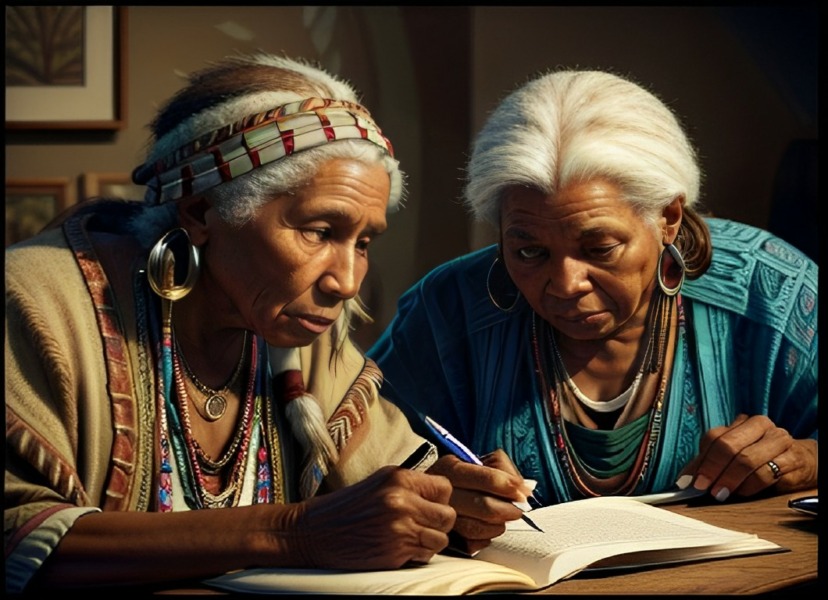What if the History Books Were Written by The Knowlege Keepers and Not The Discovers?
- TDS News
- Breaking News
- August 29, 2023

History, as we commonly know it, has often been narrated from the vantage point of the discovers/conquerors, ruling powers, and the perspectives of those who remained in control. This paradigm has shaped our understanding of the past, influencing how we perceive the rise and fall of nations, the spread of civilizations, and the interactions among various cultures. But what if history books were written from a different angle that centers the viewpoints of those historically marginalized, oppressed, and often silenced? What if the voices of the conquered recounted the stories of conquest, colonization, and exploitation?
Imagine a world where the oral storytellers weave together the rich tapestry of history – the bearers of cultural memory, the custodians of indigenous wisdom, and the preservers of narratives that have endured generations. In this scenario, the history of nations like India, the Caribbean, the Continent of Africa, and the indigenous peoples of North America would be depicted not through the lens of power but through the experiences, resilience, and narratives of those who lived through the tumultuous times of change.
Shifting the historiographical perspective to one that values the oral tradition offers challenges and opportunities. On one hand, there might be concerns about the potential for denialism and the suppression of painful chapters in history. The tragedy of events like the transatlantic slave trade, the forced removal of indigenous populations, and the atrocities committed in residential schools could be downplayed or even erased, perpetuating a cycle of ignorance and avoidance. Denying the painful parts of history prevents healing and reconciliation and perpetuates systemic issues rooted in historical injustices.
On the other hand, adopting an oral storyteller’s approach could foster a more comprehensive understanding of history. This might lead to a more tolerant and empathetic society, acknowledging the deep scars left by past wrongs while striving to rectify them. By delving into the stories of those who experienced colonization and oppression firsthand, a complete narrative could emerge that emphasizes the strength, resilience, and cultural richness of communities that have endured unimaginable hardships.

History offers valuable lessons from which societies can learn. It serves as a mirror reflecting both the best and worst aspects of human behavior. When history is approached with honesty and a commitment to understanding diverse perspectives, it provides insight into the consequences of unchecked power, the insidiousness of prejudice, and the transformative potential of unity and empathy.
In the current context, where debates about history curriculum and the narratives presented to future generations are unfolding, it’s crucial to recognize the power of history in shaping our collective consciousness. Suppressing certain narratives or cherry-picking aspects of history to present a sanitized version can lead to a distorted understanding of the past and perpetuate harmful ideologies.
As a society, it’s incumbent upon us to acknowledge the dark chapters of our past, no matter how uncomfortable they may be. Just as many nations have laws against denying the Holocaust, there should also be an ethical imperative to reckon with the history of slavery, genocide, and other atrocities. Through this acknowledgment, we can begin to heal and move forward.
Oral history is an invaluable resource in this pursuit. It offers perspectives that may have been suppressed or marginalized, shedding light on the untold stories of resilience, resistance, and cultural continuity. By integrating these narratives into the broader historical discourse, we can work towards a more comprehensive understanding of our shared past.
The idea of rewriting history books through the eyes of oral storytellers is not about erasing established narratives but rather about enriching them. It’s about acknowledging that history is not a monolithic account but a collection of diverse experiences, struggles, and triumphs. It’s about recognizing that every voice and memory contributes to the tapestry of human history.
As we navigate the complexities of the present and strive for a more equitable future, let us remember that history is a living entity, constantly evolving as new perspectives emerge. We can create a more accurate and empathetic portrayal of our past by embracing diverse narratives. One that allows us to learn from our mistakes, celebrate our shared humanity, and build a world that values the stories of all its inhabitants.








